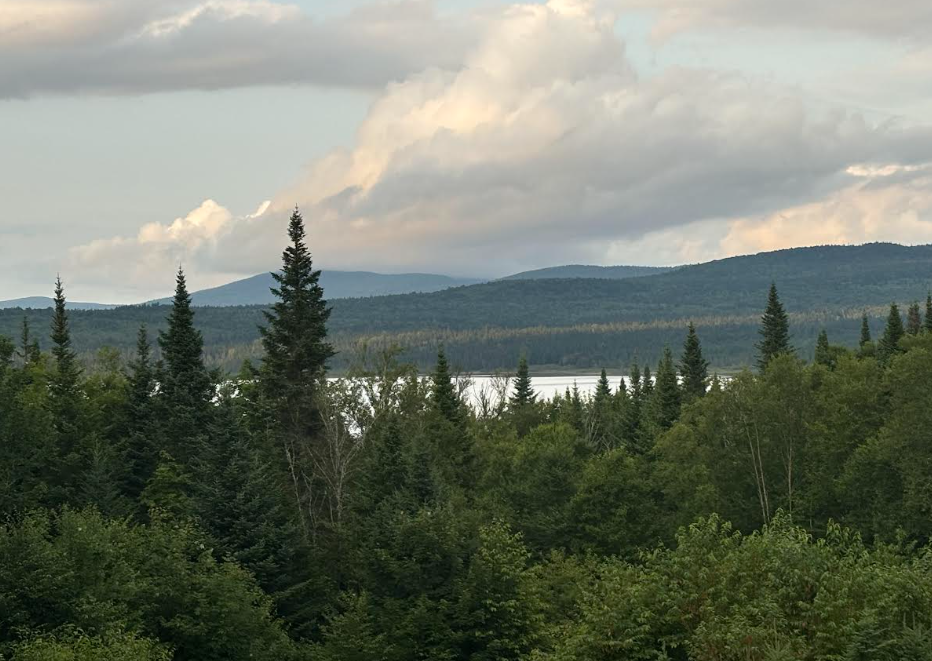By PAULA TRACY, InDepthNH.org
WEST STEWARTSTOWN – A public meeting is being planned in Pittsburg later this summer when the new owner of the 146,400-acre Connecticut Lakes Headwaters Tract will present a new version of its plan to cut wood for the next 10 years on land it has enrolled as a carbon credit farm, but which also has a state easement attached.
Sarah Stewart, commissioner of the state Department of Natural and Cultural Resources, rejected in April what she called the “first draft” of an easement proposal to reduce logging at the northern tip of the state by about 50 percent of normal because she believes it does not meet the terms of an easement the state holds on logging it and for recreation. A copy of that story is here https://indepthnh.org/2024/04/16/state-rejects-carbon-credit-co-plan-to-reduce-logging-conn-lakes-headwaters-tract/.
She and Fish and Game Executive Director Scott Mason attended the quarterly meeting of the Coos County Delegation of legislative leaders Monday morning and she pledged an opportunity for leaders to read the second draft before a public meeting is held.
Mark Brady, Coos County administrator, said it is a good first step but more needs to be done for the state to take a deep dive and noted the commissioners had asked for three meetings on the carbon issue to be held across the state.
No date for that meeting in Pittsburg has yet been set. He said Stewart was considering a meeting as well in Concord but made no commitment.
“It’s a profound issue,” Brady said and the state is up against some very sophisticated players in a whole new world of forest management. Property rights are also a subcomponent of the issue, he said.
The new property owner, Aurora Sustainable Lands of Chapel Hill, N.C. (formerly Bluesource Sustainable) https://anewclimate.com/aurora is a carbon-first company that invests in industrial forest lands to provide a verifiable carbon capture which maintains the wood standing and growing in the forest rather than cutting it, and sells that carbon-capture product to industries seeking to get to voluntary net zero emission goals or compliance with their carbon release uses.
In this particular case, the land forms the very tip of the state in Pittsburg, Stewartstown and Clarksville and is enrolled in a California compliance market.
The company bought the Connecticut Lakes Headwaters Tract more than a year ago but this land, unlike others in the company’s vast portfolio, has an easement attached which requires the state to approve logging and recreation plans.
Stewart said in an interview last week she expects any new proposal floated by the company to be subject to a public meeting in Pittsburg at the citizens’ task force and she hoped it would be in a matter of weeks.
But Brady said that is not enough, that another meeting at least needs to be held in Concord.
“This is a state issue. It’s not just about one property,” Brady stressed.
It comes at a time when the state is learning about this new way for property owners to make money from their land other than logging it.
There is concern that the state’s communities and counties will lose important timber tax income and that it will make it harder for loggers, mills and associated businesses to keep going.
But there are other concerns like what it means to access and lease rates on the property and potentially others, Brady noted.
House Bill 1697-FN signed into law July 19 requires landowners to register all lands in carbon offset programs in the state as well as set up a study on the issues of lost timber tax revenues as a result of the new practice.
Effective upon passage, the bill requires the Division of Forestry to establish and maintain a public registry of all forest lands enrolled in carbon capture, including the name of the owner, the acreage, the tax map, the date it was enrolled in a program and the term.
“Hang in there, I have no details to share at this moment but we are in the planning stages of a public meeting at the Connecticut citizens committee to present what we have received from Aurora for public comment. So we will probably hold a special meeting before the end of this summer or early fall,” Stewart said.
Stewart said she did not think their first draft was “ready” for public comment.
The Attorney General’s Office along with Patrick Hackley, state forester, are working on the easement issue.
“My intention is to release whatever information we get from Aurora ahead of that meeting so there is time to read it and review it” by interested members of the public, Stewart said.
Brady said members of the delegation said they will need more than a week to digest any new proposal and will have to defer to the state’s knowledge and hope they are looking out for their interests.
He acknowledged that the state is in negotiations with Aurora and that the approach and process is somewhat nuanced and convoluted, but he said it was crucial that the public has an opportunity to comment on it before the state approves anything and imperative that people learn about the changes and impacts to the landscape that come from carbon capture.





